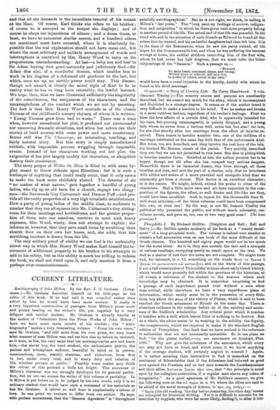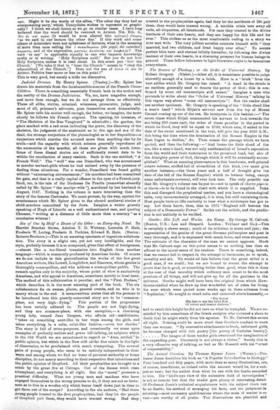Thucydidis I. By Richard Shillito. (Deighton and Bell ; Bell
and Daldy.)—Mr. Shillito speaks modestly of his book as a "scanty instal- ment" of a long-promised work. The volume is indeed over slender to contain a full annotation even on one book of the most difficult of the Greek classics. The hundred and eighty pages would not be too much for the notes alone. As it is, they also contain the text and a synopsis of various readings, occupying nearly as much space as the text. We find as a matter of fact that the notes are not complete. We might have had, for instance, in c. 12, something on the words Msvi ri Tpall14A ;3" 'EA,Aii; IT,Azirevier revro xeci XIZTLyX;?i1-0, and On the whole of this passage, if not a full examination of Thucydides'notions about early Greek history, which would more properly fall within the province of the historian, at all events a reference of the student to the sources where such knowledge may be obtained. It is somewhat surprising to find a passage of such importance passed over without a note other than critical, while elsewhere we have a very superfluous piece et information, which surely must be in the possession of every fifth- form boy about the opifin of the victory of Platasa, which is said to have reached the Greek armament at Mycale on the same day. There is abundant evidence in the volume before us of the subtlety and acute- ness of Mr. Shillito'a scholarship. Any critical point which it touches it handles with a skill which leaves little or nothing to be desired. But as a whole, the editor seems to us wanting in the solidity, the dignity, the completeness, which are required to make it the standard English edition of Thucydides. One fault that we have noticed is the reference to authorities that ate not necessarily accessible. So in one place we find, " for the plural verbal,—ria, see annotators on Aristoph. Plat. 1085." Why not give the substance of the annotators, which every one may not have at hand, and which some, if we know anything of the average student, will certainly neglect to consult ? Again, it is rather amusing than instructive to find it remarked on the sentiment of Sthenelaidas that if the Athenians had behaved as good men against the Persians, and as bad men towards the Lacedarmoniana and their allies, a4rXeriat lion, that "the principle is acted upon by the collegiate authorities, if a regular man shows any token of irregularity." As a good specimen of Mr. Shillito's manner, we give the following note on the v.1.srptin. in c. 90, where the allies are said to be afraid of the naval strength of Athens, "0 ir,41 obx :— "np.'40 (the old reading, the day before yesterday, the other day,' seems too colloquial for historical writing. Yet it is difficult to account for its insertion by copyists, who were far more likely, finding it, to alter it into
sepir. Might it be the words of the allies., 'The other day they had no overpowering navy,' which Thucydides wishes to represent so graphi- cally? I think we shall detect as we go on similar cases. I have long believed that the word should be restored to Aristot. Nio. Eth.
Err he rral s-ps5es (it would be soon altered into zpSciper) z7a-sp!r, 'as we said in our lecture the other day.' If this work and some
others of Aristotle's were not syllabuses of lectures, what is the meaning of more than once calling the swra■beepisse (the pupil, the catechist)
Azpsag4;, and of the expression, par 2104 GIXOISCETIL1 XLGI iMOSA.;;;c? The verb to say' is applicable equally to one who imparts knowledge orally or in writing. 'Holy Scripture saith.' But you do not hear Holy Scripture, unless it is read aloud. In this sense you hear the Church.' [We take it that to " hear the Church" means to "obey the admonitions of the Church."] Does not the use of ciA.Aic 11 Airs in Aristot. Politics bear more or less on this point ?"
This is very good, bat surely a trifle too discursive.



































 Previous page
Previous page